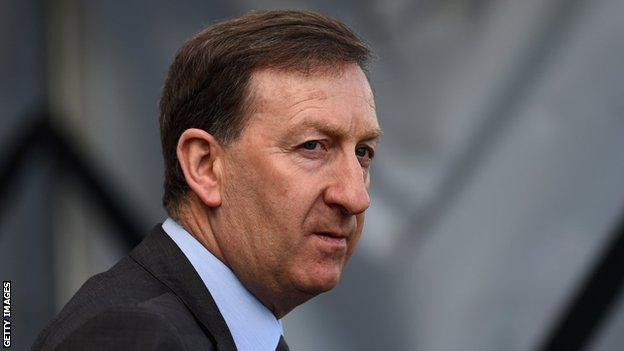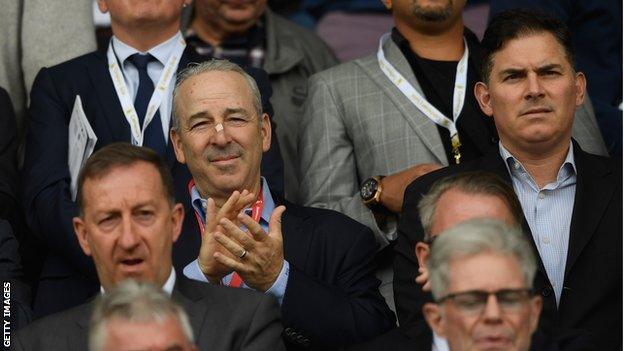Swansea City chairman Huw Jenkins resigns
- Published

Huw Jenkins was appointed OBE in the 2015 Queen's Birthday Honours.
Huw Jenkins has stepped down as chairman of Championship club Swansea City.
Jenkins, 55, was appointed chairman in January 2002 and oversaw a huge reversal in fortunes.
The club almost dropped out of the Football League in 2003 before rising up the divisions to win Premier League promotion in 2011.
"It comes with great sadness but I feel I've been left with little or no option [but] to leave my position," he said.
Swansea said in a statement, external that Jenkins' resignation allowed the club to "to draw a line under a difficult period in the club's history."
Jenkins had been criticised by some Swansea supporters since the takeover of the club in 2016 by American pair Jason Levien and Steve Kaplan,
Calls for him to step down intensified since the club's relegation to the Championship last season.
Swansea City Supporters' Trust said Jenkins deserved credit for his part in the Swans' rise to the Premier League
"However on the occasion of his resignation we must also point out, once again, his involvement in the way the sale of the football club to its current owners was conducted, as well as the continuing negative impact of that sale," the Trust said in a statement.
"It is also important to remember Mr Jenkins's culpability for the disastrous transfer dealings of the past three seasons, which are the main reason the club is in its current position.
"For these reasons, change was inevitable and necessary. History will decide Huw Jenkins' place in the annals of Swansea City."
On Saturday, the Supporters' Trust criticised the club's owners for lacking ambition and called for Jenkins to stand down.
It came in the wake of a January transfer window in which the club lost further players and made no signings.
Swansea City said in a statement that it appreciated Jenkins' contribution but added the way the club was run on a day-to-day basis has to change.
"There can be no disguising the fact recruitment has been extremely disappointing," the statement said.

Huw Jenkins had come under increasing criticism from some sections of Swansea City supporters
"For the past several transfer windows. It has left the club in a weakened position where strong action had to be taken to rectify the situation.
"Hopefully this is an opportunity for a new chapter in the club's development. It is an opportunity to rejuvenate, to bring in fresh methods of working and move forward with a strong decision-making process."
The club said the search for a leader of football operations to work closely with the senior management team and Graham Potter and his backroom staff had already began.
They added the search would be conducted in close co-ordination with the Supporters Trust.
Jenkins said Swansea City had been "a massive part of my life from a very young age."
"I have been very fortunate to fulfill my childhood dreams over the last 17 years or so providing direction and leadership at the club whilst moving through the football leagues and competing with the elite of British football in the Premier League for seven seasons," Jenkins added.
"Gradually over the last few seasons my role as Chairman providing such leadership and direction has been eroded away.
"Finally I can sit back no longer and hide behind my position and stay true to myself and my beliefs."
Swansea spent seven seasons in English football's top-flight after the beating Reading in the Championship play-off final at Wembley in May 2011.
The Welsh club won the Football League Cup in 2013 and qualifying for the Europa League.
"To have lead our football club through the greatest period in the clubs history has been a fantastic experience," Jenkins added.
"The atmosphere that we created within the club was without a doubt one of the key factors to our success over many years.

Steve Kaplan (centre) and Jason Levien (right) decided to keep Huw Jenkins (front left) as chairman when they bought a controlling stake in Swansea City in July 2016
"The directors and staff that worked with me over the last 17 years supported me with total trust and loyalty and we all shared a true Love for Swansea City and we operated like true supporters to run the club from top to bottom."
Jenkins was lauded for the managerial appointments of Roberto Martinez, Brendan Rodgers and Michael Laudrup during his time in charge of Swansea, which also saw the club move to the Liberty Stadium.
But recent seasons had seen the club struggle in the Premier League with frequent managerial changes, culminating in relegation at the end of the 2017-18 campaign.
"Sound managerial choices helped me build the football club and with the working relationships I developed provided our football club with a solid platform to achieve unrivaled success over many of those earlier years and that's one of the things l shall miss most about my time as chairman.
"I would like to thank all the staff and players past and present and the clubs supporters who have supported me fully over the last 17 years.
"It has taken me some time to finally come to this decision but the current atmosphere with in the football club on and off the football field saddens me very much and I find it very difficult to fight on in a football club I love but can no longer control."

'Jenkins has a place in Swansea's history'
By Rob Phillips, BBC Wales football correspondent
The departure of Huw Jenkins amid a welter of personal criticism is the end of an era at Swansea City.
Jenkins has been synonymous with the club since he led the rescue of the Swans from near oblivion in 2002.
He was also the figurehead of not just the startling rise through the divisions, but the development of Swansea City into being dubbed a "model club" for the way they were run during seven years in the top flight.

Huw Jenkins (left) with one of Swansea's American owners, Jason Levien
Yet, when the board - led by Jenkins - sold their shares to a consortium led by American investors Jason Levien and Steven Kaplan - at handsome personal profits - he stayed as chairman.
Fans questioned that and even as the Americans blamed "past mistakes" for the club's relegation and subsequent selling of the best playing talent, Jenkins remained.
Given the American owners are rarely at the Liberty Stadium, Jenkins was the main target for the increasingly strident and vocal criticism from the fans.
Last season in a frank meeting with the media, he said he would consider his position if the Swans dropped out of Premier League. He probably regrets he stayed on until now.
That said, he has gone having apparently put his foot down to block the deal which would have sent young prospect Daniel James to Leeds United on deadline day.
The most revealing part of the statement is surely his view that he has found it "very difficult to fight on in a football club I love but can no longer control."
Though his reputation has clearly been tarnished in the last few years as the quality of recruitment has deteriorated markedly, Jenkins deserves a special place in Swansea City's history.
The worry for Swans fans now is - who will the Americans look to, for football knowledge at the top of the club?